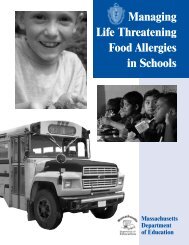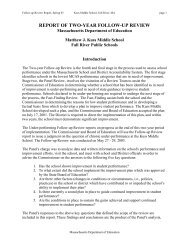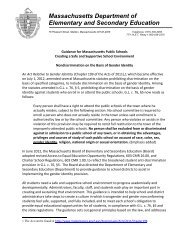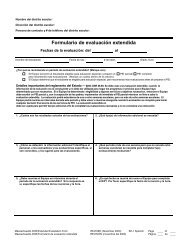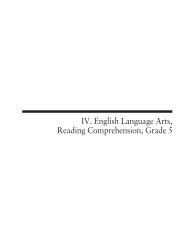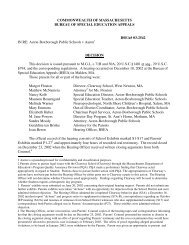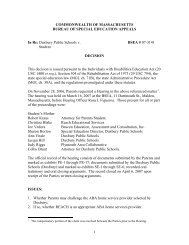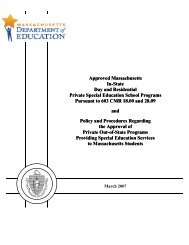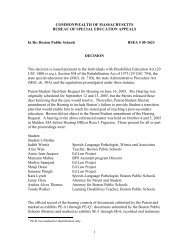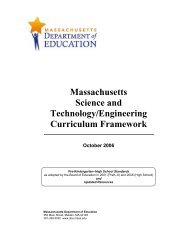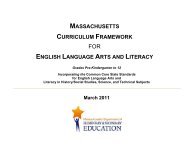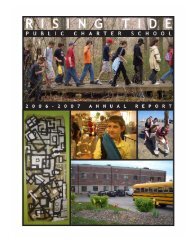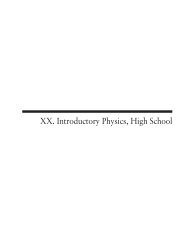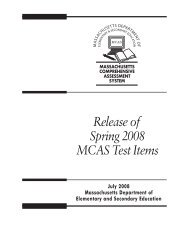2013 Educator's Manual for MCAS-Alt - Massachusetts Department ...
2013 Educator's Manual for MCAS-Alt - Massachusetts Department ...
2013 Educator's Manual for MCAS-Alt - Massachusetts Department ...
You also want an ePaper? Increase the reach of your titles
YUMPU automatically turns print PDFs into web optimized ePapers that Google loves.
BIOLOGY INTRODUCTORY PHYSICS<br />
Topics: Topics:<br />
1. The Chemistry of Life 1. Motion and Forces<br />
2. Cell Biology 2. Conservation of Energy and Momentum<br />
3. Genetics 3. Heat and Heat Transfer<br />
4. Anatomy and Physiology 4. Waves<br />
5. Evolution and Biodiversity 5. Electromagnetism<br />
6. Ecology 6. Electromagnetic Radiation<br />
CHEMISTRY TECHNOLOGY/ENGINEERING<br />
Topics: Topics:<br />
1. Properties of Matter 1. Engineering Design<br />
2. Atomic Structure and Nuclear Chemistry 2. Construction Technologies<br />
3. Periodicity 3. Energy and Power Technologies—Fluid Systems<br />
4. Chemical Bonding 4. Energy and Power Technologies—Thermal Systems<br />
5. Chemical Reactions and Stoichiometry 5. Energy and Power Technologies—Electrical Systems<br />
6. States of Matter, Kinetic Molecular<br />
Theory, and Thermochemistry<br />
6. Communication Technologies<br />
7. Solutions, Rates of Reaction, and<br />
7. Manufacturing Technologies<br />
Equilibrium<br />
8. Acids and Bases and Oxidation-<br />
Reduction Reactions<br />
Work samples generated during one or more of the following activities must be provided in the<br />
portfolio that document the student’s scientific knowledge, skills, and understanding in the selected<br />
discipline at the grade 9 or 10 level, as identified by the <strong>Massachusetts</strong> Science and Technology/<br />
Engineering High School Standards:<br />
• conducting investigations:<br />
o For example, the student engages in exploratory activities in which he or she identifies a<br />
key question, designs a process <strong>for</strong> gathering in<strong>for</strong>mation and investigating the question,<br />
and incorporates scientific knowledge to produce a response, inference, conclusion, or<br />
analysis of findings.<br />
• per<strong>for</strong>ming laboratory experiments:<br />
o For example, the student develops a hypothesis, designs or identifies a procedure <strong>for</strong><br />
testing the hypothesis, per<strong>for</strong>ms a controlled experiment or series of trials, collects data<br />
accurately, summarizes and analyzes the results, and draws conclusions.<br />
• conducting research:<br />
o For example, the student undertakes an activity in which he or she locates and applies<br />
available scientific knowledge and/or data from texts, articles, research summaries, etc.,<br />
in order to describe a process or aspect of the discipline and provides a synthesis of the<br />
knowledge acquired, supportable conclusions, and an analysis of findings.<br />
• conducting data analysis:<br />
o For example, the student accurately collects data generated either by the student, class, or<br />
teacher or data compiled from external sources and describes, synthesizes, and analyzes the<br />
data to articulate patterns, explain relationships between variables, and draw conclusions.<br />
• completing an independent writing activity:<br />
o For example, the student writes a persuasive essay or answers a series of guided openresponse<br />
questions which provide an analysis of scientific materials or data in support of<br />
a particular conclusion or point of view.<br />
• developing a scientific model to represent a natural system:<br />
MASSACHUSETTS COMPREHENSIVE ASSESSMENT SYSTEM<br />
<strong>2013</strong> Educator’s <strong>Manual</strong> <strong>for</strong> <strong>MCAS</strong>-<strong>Alt</strong><br />
29



